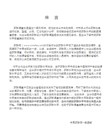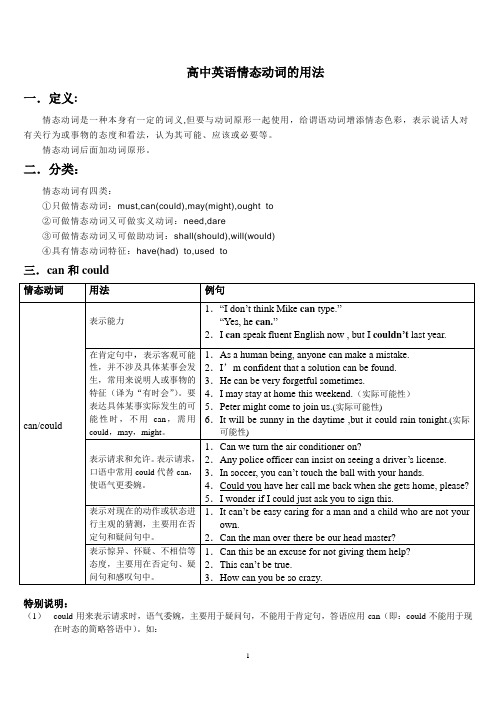高中英语情态动词讲义
高中英语语法情态动词与虚拟语气讲解

高中英语语法情态动词与虚拟语气讲解情态动词的基本用法情态动词具有一定的词义,没有人称和数的变化,必须和其他动词一起构成谓语,用来表示愿望、态度或推测等。
1.表示能力(2)表示将来的能力:will be able to(3)表示过去的能力I can't promise anything, but I'll do what I can.我不能许诺什么,但我会尽力而为。
(表示现在的能力)The fire spread through the hotel very quickly but everyone was able to get out.尽管这场大火迅速蔓延到了这个宾馆,但是每个人都逃了出去。
(表示过去有能力做并且成功地做了)I could have worked out the problem, but I was too nervous.我本来可以解出这道题,但我太紧张了。
(表示本来有能力做但未做)2.表示推测(可能性)可能性可分为客观的可能性和具体事情实际发生的可能性两种。
(1)客观的可能性并不表示具体某事是否会发生,而用来说明人或事物的特征。
情态动词can可用于肯定句中表示客观的(或理论的)可能性,而表示具体事情实际发生的可能性时, can 一般不用于肯定句。
Accidents can happen on such rainy days.在这样的多雨天气里可能会发生事故。
(表示客观的可能性)We may go to the cinema tonight, but we are not sure yet.今晚我们可能去看电影,但还没确定。
(表示实际可能性,不用can)(2)表示具体事情实际发生的可能性表示具体事情实际发生的可能性的层次(由强及弱)比较:①在肯定句中表示推测(must/have to, should/ought to, may, might, could)a.当说话者表达怀疑或犹豫之意时,需用may, might或could, 其中might, could比may所表达的怀疑或犹豫之意更强。
高中英语语法讲义-情态动词

He may [might] be writing a letter. 他可能在写信。
They may [might] be going abroad next month. 他们可能在下个月出国。
③ 后接动词完成式,表示对过去可能发生的事进行推测:
另外,could还可与表示感知的动词(如see, hear, smell, taste, feel, understand等)连用表示的特定能力:
Looking down from the plane, we could see lights on the runway. 从飞机上向下看,我们可以看见机场跑道上的点点灯火。
2) 表示委婉的批评或责备:
You might have made greater progress. 你的进步本来可更大一些的。
You might at least have answered my letter. 你至少可以回我一封信嘛。
③ 表示“差点儿就要”:
I could have died laughing. 我差点儿笑死了。
二、may与might的用法
1. 表示允许
注意以下两种情况:
(1) 表示请求允许(即请求别人允许自己做某事),两者都可用,只是 might 表示的语气较委婉(但并不表示过去):
May [Might] I sit here? 我可以坐在这里吗?
1) 表示过去某事可能发生而实际上却并没发生:
A lot of men died who might have been saved.很多人本来可以获救的却死了。
It was really very dangerous. I might have killed myself. 那真的是太危险了,我差点没命了。
高中英语语法系统讲解之八情态动词和虚拟语气

高中英语语法系统讲解之八情态动词和虚拟语气情态动词一. 情态动词的类型和特征1. 类型○1只作情态动词用的有:can(could),may(might),must,ought to。
○2可作情态动词也作实义动词的有:need,dare。
○3可作情态动词也作助动词的有:shall(should),will(would)。
○4具有情态动词某些特征的有:have(had)to,used to。
2. 特征情态动词有一定的词义,但不能单独作谓语,须和实义动词或系动词连用,构成谓语;且适用于主语的各种人称和数(have to例外),主语是第三人称单数时,要用has to。
二. 情态动词的基本用法1. can与could○1表示能力或客观可能性,还可表示请求和允许,她存在以下几种形式:如Children can be troublesome sometimes.○2表示惊异、推测、怀疑、不相信的态度(主要用于否定句、疑问句中)。
如This can’t be done by him.○3can的习惯用法A. can but的用法can but“只好,至多不过”,如We can but do our best.B. cannot help but,cannot help的用法二者都表示“不得不;不能避免;不禁”;但前者后加动词原形,后者加代词或动名词等。
如The girl couldn’t help but live on herself.When I try to speak, I can’t help making mistakes.C. cannot … too“无论怎样……都不过分;越……越好”如We can’t thank you too much for what you have done for us。
We can not be too careful to cross the road.温馨提示:○1can与be able to:can表示有能力做某事,be able to表示通过努力、克服困难做成某事。
【高考】英语语法完全讲解情态动词ppt课件

can/could have done“过去本能够做某事,实际上并 没有做”。 You could have done better, but you didn’t try your best.
may/might have done“过去也许已经做过某事”,否 定形式may/might not have done表示“过去可能没做 过某事”;might have done还表示“过去本可能做某 事,实际没有做”。 It’s too late. I think he may have gone to bed. He may/might not have finished the work. But I think you might have told us half an hour ago.
--Yes, you can/may(No, you can’t/mustn’t). 2、shall在疑问句中与第一人称连用时,表示征求对方意见; 情态动词can和could常用来表示“能力”,强调能够做某事,can表示现在的能力,could表示过去的能力。
He dared not look at her in the face. You could have done better, but you didn’t try your best.
2.中国应对全球化的政策
Tom’s father promises 44、关于(爱)这个字眼,又有几人能读懂能将其看透。
:北方地区
that
he
shall
buy
his
son
a
new bike on his birthday.
第四大类:表示必要、偏要
must表示主观上必须做某事,mustn't表示“禁止、一定不可 以”,还可以表示“偏偏、偏要”,have to表示受客观条件的 限制,不得不做某事。should表示应该做某事,有义务做某事, 此外,should还可以表示“竟然、居然”。 Children mustn’t play with fire. She must do anything against her parents’ will. You should go and visit him this afternoon. It is unbelievable that the poor man should help others. Why should you be so late today? --Must I work out the problem tonight? --No, you needn’t/don’t have to.
高中英语情态动词的用法讲义

高中英语情态动词的用法一.定义:情态动词是一种本身有一定的词义,但要与动词原形一起使用,给谓语动词增添情态色彩,表示说话人对有关行为或事物的态度和看法,认为其可能、应该或必要等。
情态动词后面加动词原形。
二.分类:情态动词有四类:①只做情态动词:must,can(could),may(might),ought to②可做情态动词又可做实义动词:need,dare③可做情态动词又可做助动词:shall(should),will(would)④具有情态动词特征:have(had) to,used to三.can和could特别说明:(1)could用来表示请求时,语气委婉,主要用于疑问句,不能用于肯定句,答语应用can(即:could不能用于现在时态的简略答语中)。
如:——Could I use your dictionary?——Yes, you can.(否定回答可用:No, I’m afraid not.或者是you can’t)表示推测时,could不是过去式,只是语气更委婉;若是推测已发生的事或过去的情况,用can/could have done (2)can和be able to辨析can(could)和be able to都可以表示能力,意思上没有区别。
但can只有现在式和过去式,而be able to则有更多的形式。
如:I’ve always wanted to able to speak fluent English.Those bags look really heavy, are you sure you’ll be able to carry them on your own?但是,表示在过去某时的某一场合经过一番努力,终于做成了某事,通常不用could,而用was/were able to来表示。
这时,was/were able to相当于managed to do或succeed in doing。
2023届高考英语语法:情态动词考点分析讲义

2023年高中英语语法:情态动词考点分析needn't have done与didn't need to do用法区别needn't have done 主要表示某事已经做了,但后来觉得没必要去做,因此常含有责备或遗憾之意;didn't need to do 则不具体表明某事是否做了(即可能做了也可能没有做,此用法中的need 为实意动词):I got up early, but I needn't have done so, because I had no work to do that morning.我起床起得很早,但我本来不必起那么早的,因为我那天早上没什么事做。
I didn't need to get up early this morning. so I staved in bed until9am.今天早上我不必早起,所以我一直睡到上午九点钟才起床。
若没有特定的上下文,有时可能有歧义:I didn't need to go the office yesterday.(1)我昨天无需去那儿。
(所以没去)(=I didn’t have to go there yesterday.)(2)我昨天本来不必去那儿的。
(但我却去了)=I needn't have gone there yesterday, )will与would七大用法归纳用法一:表示意愿will 表示现在的意愿,would表示过去的意愿:I will pay you at the rate you ask.我愿意照你要求的价钱付款。
Go where you will. 你愿到哪里就到哪里。
He wouldn't help me yesterday.他昨天不愿帮助我。
She asked if I would go with them. 她问我是否愿同他们一起去。
情态动词(二)(讲义)

1. 基本掌握情态动词ought to、need等词的基本含义和用法。
2. 系统掌握情态动词用于表推测的用法和“情态动词+have done”的特殊含义。
重点:情态动词表示推测的基本用法与区别。
难点:识记并掌握“情态动词+have done”的特殊含义。
1. 情态动词是英语语言当中一个非常重要的元素,在各类文章和题型中经常出现,并且在高考语法填空和短文改错中也多有考查。
2. 情态动词的基本用法在阅读和书面表达当中也有着非常重要的影响,尤其是在写作中考生经常在情态动词用法上出错,需要引起重视。
ought to的用法By now his restaurant ought to be full of people.到了这个时候,他的餐馆本来应该是顾客盈门的。
1. ought to意为“应该,应当”,其后必须跟动词原形,只有一种形式,没有人称和数的变化。
2. ought to表示推测,暗含很大的可能性;还可表示“有义务或责任做某事”,语气比较强;还可表示“建议或劝告”。
3. ought to的否定形式为ought not to或oughtn’t to,其一般疑问句形式是将ought置于主语前。
4. “ought to+have done”结构相当于“should+have done”结构,表示“本应该做某事而事实上并没有做”,其否定结构表示“不该做某事实际上却做了”。
①You ought to make an apology to Joan.你应该向Joan道歉。
②Jeffrey ought to be there by now.Jeffrey现在应该在那儿了。
③You ought not to / oughtn’t to be late for such an important meeting.这么重要的会议你不应该迟到的。
④Ought I to hand in my composition now?我应该现在把我的作文上交吗?⑤You are late. You ought to / should have arrived five minutes earlier.你迟到了,你本应该早五分钟到的。
高中英语情态动词讲解

4) cannot (help\choose)but +动词原形 “不得不,只能” I cannot help but tell her the truth. cannot help it “控制不住,没有办法 ” cannot … too…… “无论怎样也不为过” I cannot thank you too much cannot help doing sth 禁不住做某事 5)couldn„t +动词原形+比较级 (再……不过了) It couldn't be better. I couldn't agree with you more.
A. could have stayed B. could stay C. would stay D. must have stayed
7. The weather turned out to be fine yesterday. I__ the trouble to carry my umbrella with me . A. should have taken B. could have taken C. needn't have taken D. mustn't have taken 8. He paid for a seat, when he__ have entered free. A. could B. would C. must D. need
3. ---- What does the sign over there read? ---- "No person ______smoke or carry a lighted cigarette,cigar or pipe in this area." A.will B.may C.shall D. must 4. John, look at the time. _______ you play the piano at such a late hour? A. Must B. Can C. May D. Need 5. You can‟t imagine that a well-behaved gentleman ____ be so rude to a lady. A. might B. need C. should D. would
- 1、下载文档前请自行甄别文档内容的完整性,平台不提供额外的编辑、内容补充、找答案等附加服务。
- 2、"仅部分预览"的文档,不可在线预览部分如存在完整性等问题,可反馈申请退款(可完整预览的文档不适用该条件!)。
- 3、如文档侵犯您的权益,请联系客服反馈,我们会尽快为您处理(人工客服工作时间:9:00-18:30)。
情态动词之知识精要1.表示能力,意为“能,会”,用can, could, be able to均可,could是can的过去式。
区别是:can只有过去时could,而be able to有多种时态。
can表示一贯的能力,be able to表示客观能力和通过努力可以达到的能力John can speak three foreign languages fluently. 约翰能流利地说三门外语。
John could swim when he was four. 约翰四岁时就会游泳。
I regretted that I hadn’t been able to drive him home. 我后悔我没能开车送他回家。
Will you be able to help me learn English tomorrow? 明天你能帮助我学习英语吗?2.表示请求或允许,意为“可以”时,用can、could或may均可,不过can比may更正式,could比can语气更委婉。
Can I park my car in front of your office? 我能把我的车停在你的办公室前面吗?----Could I use your bike now? ---Certainly. Go ahead.May I have a look at the photos that you took yesterday? 我能看一下你昨天拍的照片吗?3. must, can, may/might表推测时的用法。
表推测时must用于肯定句,can用于疑问句和否定句,may/might用于肯定句和否定句。
must用于否定句时不表推测,表示“禁止,千万不做…”。
The man standing over there must be a doctor. 站在那边的那个男子一定是个医生。
The man standing over there can’t be a doctor. 站在那边的那个男子不可能是个医生。
He may be out now. 他可能出去了。
I think you mustn’t change the way that you live. 我想你千万不要改变你的生活方式。
(句中的must不表推测,表禁止。
)must 的否定式有两个:当回答由must引起的问题时,否定答复要用needn‟t或don‟t have to 表示“不必”、“无当表示“不应该”、“不许可”、“禁止”时,就用must not。
Must I go tomorrow? 明天我必须去吗?Yes, please. 是的,请吧!No , you needn’t. 不,你不必去。
can和may表推测都可用于否定句,但can‟t的意思是“不可能”,may not的意思是“可能不”。
可见can‟t的否定意味更强。
A teacher like her may not be popular with the students. 像她这样的老师可能不会受到学生的欢迎。
A teacher like her can not be popular with the students. 像她这样的老师不可能会受到学生的欢迎。
might 1)表过去的“可能”和“允许”多用于间接引语。
She said that he might take her dictionary. 她说他可以拿她的词典去用。
2)表现在的“可能”,其可能性要比may小。
Electric irons could be dangerous; they might give you a severe shock. 电熨斗会有危险,它可能电着人。
4.can和may都可以用于肯定句中表示可能性,注意它们的的区别。
can表示可能性时是“理论上的(或逻辑上的)可能性”,并不是说话人的主观猜测,意为“有时会…”。
may表示的是“现实的可能性”。
In the north of Canada it can snow in June. 在加拿大的北部六月份有时会下雪。
The road is narrow and it can be blocked sometimes. 这条路窄,有时会堵车。
Jane has promised she will be here at 8:30,but it is 9:00 now and she hasn’t turned up. The road may be blocked.简答应8:30到这儿,但现在9:00了她还没到。
路上可能堵车了。
5. shall是近几年全国各省市高考中考查频率较高的一个重点情态助动词。
主要掌握以下内容:shall与第一人称搭配,用于疑问句,表提出请求或征求意见;与二、三人称搭配,用于陈述句(肯定句和否定句),表警告、威胁、允诺、命令、强制、决心等。
Shall he open the window? 他打开窗户好吗?(表征求意见)You shall get the justice that you want. 你会得到你想要的公平。
(表允诺)You shall not use my camera if you don’t use it properly. 如果你不正确使用,我不会让你使用我的照相机(表警告)No, he shan’t go. 不! 他不能去。
(表命令)Nothing shall stop us from carrying out this plan. 什么也阻挡不了我们实施这项计划。
(表决心)6. must和should推测之外的用法。
上面讲了must在肯定句中表推测的用法,must在肯定句中还有“必须”的用法。
注意二者不要混淆。
另外,must还有“偏偏,非要做…”的意思。
We must do everything step by step. 我们一定要一步一个脚印地做每一件事情。
If you must smoke, please go outside. 如果你非要抽烟,请出去。
When everybody was in bed, he must turned the radio on. 大家都上床睡觉了,他偏偏把收音机打开了。
should表示吃惊、赞叹、不满等情绪,也是近几年来的高考热点。
It’s wonderful that you should have achieved so much in these years. 这几年你们有了这么大的成就真了不起。
You can’t imagine a gentleman like him should treat a lady so rudely.你想象不出来象他这样一位绅士竟然会如此粗鲁地对待一位女士。
7.need和dare即可以作情态助动词,也可以作实义动词。
need用作情态助动词时,无人称、数、时态的变化,主要用于否定句和疑问句。
You don’t need to do it yourself. 你不必亲自去做这件事。
(实义动词)You needn’t do it yourself. 你不必亲自去做这件事。
(情态助动词)dare用作情态助动词时,无人称、数的变化,但有过去时态,主要用于否定句、疑问句和条件句。
You should dare to say no to her requirement. 你应该敢于拒绝她的要求。
(实义动词)You daren’t say no to her requirement. 你不敢拒绝她的要求。
(情态助动词)8.情态助动词+ have done sth.情态助动词+ have done sth. 表示对过去(而不是现在或将来)应该发生而未发生的事情的态度和推测,不同的情态助动词表示不同的意思,这也是近几年来高考的热点。
should/ought to have done sth. 表示过去本应该做某事而事实上未做。
I should have driven her home yesterday evening. 昨天晚上我该开车送她回家了。
(事实上没有送她回家)shouldn‟t/oughtn‟t to have done sth. 表示过去本不应该做某事而事实上做了You shouldn’t have had a quarrel with her. 你不该与她吵架了。
(事实上与她吵过了)need have done sth. 表示过去本有必要做某事而事实上未作You need have met her at the station. 你很有必要到车站接她了。
(事实上没去车站接她)needn‟t have done sth. 表示过去本无必要做某事而事实上做了You needn’t have cleaned the room for me. 你不必为我打扫房间了。
(事实上已打扫了)could have done sth. 表示过去本可以做某事而事实上未做I wasn’t busy then and you could have asked me for help. 我当时不忙,你本来可以向我求助的。
(事实上未向我求助)注意:上述表达都是虚拟语气,与事实相反。
而must have done sth.和can‟t have done sth.只是对过去事情的推测,不表示与事实相反。
The ground is wet and it must have rained last night. 地湿了,昨天夜里一定下雨了。
His bike is here and he can’t have gone back home. 他的自行车还在这儿,他不可能回家了。
知识点睛:had better, should, ought to(一)否定句had better, should, ought to用于否定句时,否定词均位于其后,具体形式为:had better not do, shouldn't / should not do, oughtn…t to do。
例1:You had better not start at this time.例2:She oughtn't to waste time.(二)一般疑问句had better, should, ought to用于一般疑问句时,分别将had, should, ought提至句首。
例1: Had he better start early at once?例2:Should you do like this?例3:Ought he to go there?(三)反意疑问句陈述句谓语动词含had better, should, ought to时,反意疑问句为:had, should与ought+主格人称代词或hadn…t,shouldn‟t,oughtn…t+主格人称代词。
